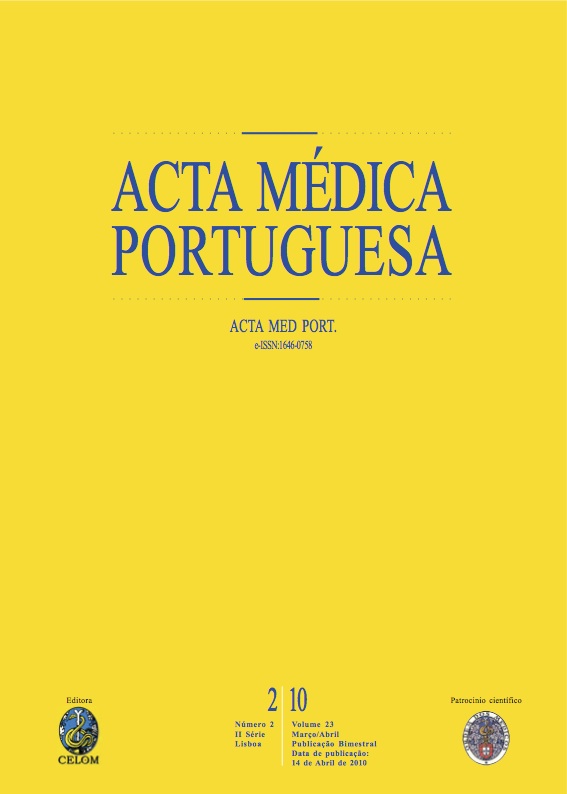Effectivity of screening, concepts and attitudes towards metabolic síndrome: a study in bipolar patients followed in Hospital Santa Maria psychiatric consultation.
DOI:
https://doi.org/10.20344/amp.618Abstract
The Metabolic Syndrome (MS) is constituted by a set of specific metabolic alterations being postulated that the main dysfunction is insulin resistance, associated with abdominal type obesity, hypertension, hyperglycemia and dyslipidemia. Epidemiological data indicates prevalence of MS of about 25%. Estimates point to higher prevalence of MS in bipolar (BP) patients, between 30 to 35%. Cost-effective screening methods, not recurring to blood test, have been researched.Test the viability of MS screening without using blood tests. Analyse knowledge and importance given to the issue of MS in Bipolar patients.Observational, cross-sectional, exploratory study. Random sample of 15 BP patients, in euthymic phase, between 18 and 65 years. Semi-structured interview, YMRS, HAMD were applied. MS diagnosis was investigated according to the International Diabetes Federation (IDF), including blood tests. Screening of MS was defined positive if blood pressure > or = to 130/85 or on anti-hypertensive medication and Abdominal Perimeter > 90 cm in males or > 80 cm in females. Afterwards a questionnaire about knowledge, attitudes and concerns on MS was applied.14 patients completed the investigation protocol, 1 patient didn't do blood testing for unknown reasons. Five patients (36%) met IDF criteria for MS. Screening sensitivity was 80% and specificity 78% on our sample (1 false positive and 2 false negative). Twelve patients (80%) were overweight or obese. Mean IMC in patients that met IDF criteria for MS was 30 while in the other group mean IMC was 26, showing statistical significance. Only 3 (20%) have ever heard about MS, but the majority of the patients were concerned, in decreasing order, about weight gain, blood pressure cholesterol and hyperglycemia control.Although limited by small sample size, this study strengthens the idea that MS screening can be effective in clinical practice, it also indicates the need to educate BP patients about MS and to prevent overweight.Downloads
Downloads
How to Cite
Issue
Section
License
All the articles published in the AMP are open access and comply with the requirements of funding agencies or academic institutions. The AMP is governed by the terms of the Creative Commons ‘Attribution – Non-Commercial Use - (CC-BY-NC)’ license, regarding the use by third parties.
It is the author’s responsibility to obtain approval for the reproduction of figures, tables, etc. from other publications.
Upon acceptance of an article for publication, the authors will be asked to complete the ICMJE “Copyright Liability and Copyright Sharing Statement “(http://www.actamedicaportuguesa.com/info/AMP-NormasPublicacao.pdf) and the “Declaration of Potential Conflicts of Interest” (http:// www.icmje.org/conflicts-of-interest). An e-mail will be sent to the corresponding author to acknowledge receipt of the manuscript.
After publication, the authors are authorised to make their articles available in repositories of their institutions of origin, as long as they always mention where they were published and according to the Creative Commons license.









